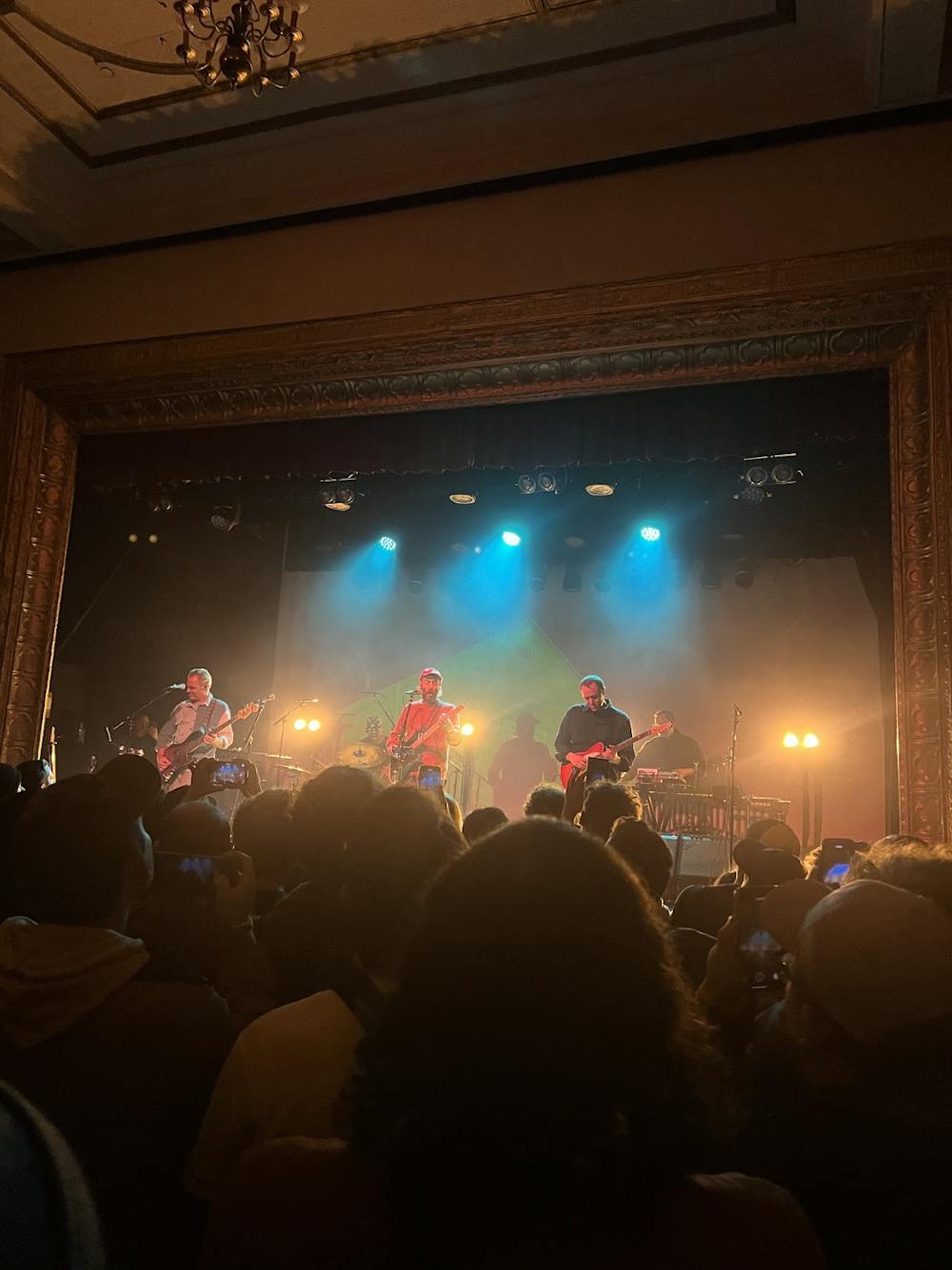Two Saturdays ago, I traveled to Brooklyn to see the band American Football on their tour commemorating the 25th anniversary of their first album’s release. “American Football” — sometimes nicknamed LP1 — was released on Sept. 14, 1999, and changed emo music forever.
Though there have been albums classified as “emo” that predate “American Football” — “Rate Your Music”, ever the authority, informs me that 1993 marks the first sprinklings of the criteria being met — this album perfectly actualized what is now known as midwest emo, a wonderfully imprecise genre name (as they all are, and must be).
Referring more closely to a particular sound palette than an actual regional specificity, midwest emo blends into coherence the genre of emo, with all of its thrashing and rough emotive passion, with the cooler and calculated guitar work and time signature creativity of math rock. “American Football” is a record that brings this pairing into ingenious fruition, finding the restless and wanting desperation of the heart shaking hands with the brain’s clever harmonic inventiveness, without either of the two modes ever feeling underpowered.
That Saturday night, with all of its unseasonable warmth and golden late-October splendor, was perhaps an ideal admixture of time and circumstance in which to experience that record, live and in completion. “American Football” is a production of perpetual autumn — if, for no other reason, the second track is titled “The Summer Ends” — and is a vessel for many emotional registers, none of them happy but all of them affixed to the gentle dissolution of seasons and former selves, to people folding back into themselves and emerging again as strangers.
So, already a work of retrospectivity, the anniversary concert allowed for the listeners and the band to stand together and turn backwards, conjoining the visions of maker and receiver to review not only the album but the various ways in which we have grown up alongside the nine songs that compose it. At one point during the show, singer and guitarist, Mike Kinsella, mentioned that even though the songs are over a quarter-century old, he can still surrender himself to the memories of their creation, and of all the thwarted, embittered romances which enable(d) them to be.
The main set of the concert began with “Five Silent Miles”, a very early instrumental tune, and proceeded into all but the first track from LP1 — a fact I’ll return to later — played in the order in which the songs appear on the record. The second set was decidedly less organized, featuring songs from their second and third albums which, despite the band’s perennial entrenchment in subcultures, never achieved even half as much critical acclaim and culty adherence as “American Football”. A song I wish appeared on the setlist that night but was sadly absent is the band’s cover of “Fade Into You”, the dreamy mission statement of Mazzy Star which, in 2019, American Football transmuted into a seven-minute odyssey of chiming, arpeggiating guitars, crashing cymbals, shining horns and gorgeously plaintive pedal steel.
To end their show, as they do all of their concerts, American Football played the first song off of “American Football”, titled “Never Meant” — which has recently spiked in popularity due to being included in a Tim Walz campaign video — which heralded in the collective emotional apotheosis of the two-odd hours of music. When people discuss American Football, especially in spaces where the music mainstream rubs shoulders with the just-decentered world of midwest emo, no song in their discography emblematizes their artistic ethos more than “Never Meant.”
In some sense, “Never Meant” crumbles under the pressure of its own stereotyping: It’s a remarkable song, striated with all the necessary footprints of midwest emo — intricate riffs falling over each other, almost painfully simple lyrics and vocals exchange precision for affective slam — but it’s come to be a shorthand for the original iconography of the subgenre. Today, especially online, speaking about or playing “Never Meant” is often an allusive gesture, pointing less towards the eminent brilliance of the music itself and more towards the aesthetic associations out of which midwest emo culturally unfurled: basement concerts, suburban angst, long gray afternoons, flannel, Miller High Life, gas station parking lots, regret.
But within the space of the concert venue, with the straining voices of the audience collaborating in the warm air with Kinsella’s hearty wailing, all reservations about memes, guilt and performative listening were gone. My fellow concertgoers, who I imagine were in similar or possibly stronger tempests of heartbreaking sense-memory assaults, climbed into the half-imaginative, half-real world of “American Football”’s most definitive assertion and joined in an incantatory expressivity of togetherness in sound, in season and in memory.
This is where the beauty of the music and the circumstance was, and will forever be — this eruption of individual (re)experiences summoned forth by a shared devotionality to song, a band, a common metaphysics of falling apart that is at once so particularized across the lives of each audience members and, yet, recognizably embodied within the confines of the album’s mission.
The magic of a reunion tour is, I think, that you can inhabit two worlds simultaneously, without any static interference or splitting: the material plane of where you are, the heads obscuring your view and the color of the lights and the immanent miracle of you standing in the music; and then the sepia world of days long passed, and all the people, places and things that populate the little cosmologies of these songs in the historiography of your life. And perhaps the final lesson is just that astonishing duality — that this stuff is still right there, and that this dreaming in double is never unavailable, and that it engenders an infinitude unto itself. Even after everything changes.

Cole Chaudhari ’26 (he/him) is a Managing Editor.
Cole is a managing editor at The Campus, where he has previously served as a news editor, copy editor, and staff writer. He is a junior, and is studying history and literature.




